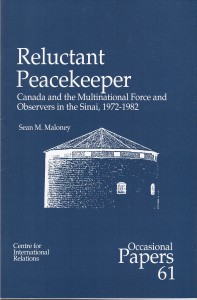
Intro:
2006 marks the twentieth anniversary of the commitment of the Canadian Forces to the Multinational Force and Observers (MFO). The orange-bereted, US-led force, established in the wake of the Camp David summit of 1979, replaced the United National Emergency Force II which itself deployed to the region five years earlier following the Yom Kippur War. The MFO, headquartered in Rome, incorporated new concepts of how to employ technical intelligence-gathering methods in a peacekeeping and confidence-building environment. Unlike most Cold War peacekeeping operations, the MFO operated in comparatively benign environment, the wind, sand, and landmines of the desolate Sinai peninsula notwithstanding.
Yet the government of Pierre Elliott Trudeau was reluctant to commit Canadian military personnel to join the MFO when it was canvassed by the United States, Egypt, and Israel in 1981. It was only after the Mulroney Government took over in 1984 that the policy was reversed with the first Canadians joined the Sinai-based force in 1986. Canadian peacekeeping mythology would have us believe that Canada took the lead and enthusiastically contributed to every peacekeeping mission since 1945. This case study will challenge this mythology. Additionally, this study will examine the factors which contributed to making Trudeau and his coterie of unelected and elected advisors reluctant peacekeepers. Indeed, the MFO decision was an occasion where the so-called “Sharp Criteria,” established by Secretary of State Mitchell Sharp in the mid- 1970s to move Canada away from automatic commitment to peacekeeping, was in part employed to justify the decision not to commit to the MFO.
In effect, the Trudeau Government’s decision in 1980-81 became a missed opportunity to leverage influence with Canada’s largest ally and trading partner, the United States and may even have jeopardized the fragile peace established in the wake of the 1973 Arab-Israeli War. The MFO decision further cements the case that the Trudeau Government’s national security policy had, by the 1980s, completely diverged from the clear directions established during the first half of the Cold War, particularly those established by Lester B. Pearson, and also diverged into a contradictory posture driven by more by catering to Third World opinion, and indulging in anti-American prejudices than by a clear calculation of Canadian national security interests.